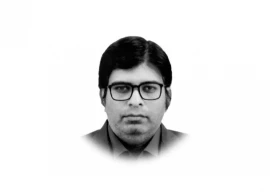
In a recent decision, the Sindh government has opted to hire a third party to conduct secondary and higher secondary examinations instead of instituting reforms in the services of five Boards of Intermediate and Secondary Education (BISEs). However, this decision is rife with complications.
The question arises: is the third party expected to raise the quality of the examination? If so, then what is the current quality of BISE examinations and how is it influencing the teaching and learning process in schools? This article only addresses this issue, subsequent articles would focus on logistic and political issues.
In 2016, Sukkur IBA conducted extensive research to evaluate the quality of items used in the BISEs examinations and how these influence teaching and learning. Using a desk review approach, the ten-year examination papers from 2005 to 2016 were selected from English, Mathematics and Sciences (Biology, Physics, and Chemistry) of grades X and XII. Each item in the question papers was analysed to determine its cognitive complexity using Bloom’s taxonomy, the frequency, and variety in which each item was repeated in the different years and the chapters from where these items were taken. The findings reveal that most of the items assessed students’ memorisation and comprehension. On the contrary, the National Curriculum proposes developing analytical, evaluative and creative skills of grade X and XII students.
Likewise, items were frequently repeated word for word every year, creating a pattern that the tuition centre “gurus” use to predict the upcoming paper and float their “guess papers” in the market. The accuracy of their prediction increases their market value, thus attracting more students to their private tuition centres. This repetition pattern is also good for the business of local publishers who publish handy guides, good to be used for cheating during examinations.
Similarly, some chapters were given more priority and others were ignored in the examination. Thus the concepts of ‘important’ and ‘unimportant’ chapters emerged among students and teachers, who devotedly focus on all the ‘important’ chapters and religiously avoid the ‘unimportant’ ones. The syllabus, particularly for Science, is designed in a way that students may gradually develop their conceptual understanding of the scientific concepts as they proceed to higher graduates. Missing a chapter or two leaves a conceptual gap, which hinders their understanding of complex concepts taught in higher education.
Good or bad, the traditional examination pattern of BISEs has shaped what Pierre Bourdieu, a French sociologist, called the ‘habitus’ of the masses, and some financially or intellectually powerful ones yield ‘social capital’ out of it. That is to say that they ill-use the gaps in the examination to get better grades so as to get admission to elite disciplines like medical or engineering universities. Whether or not these privileged ones succeed in higher education requires a thorough discussion. It is quite clear that the majority of mediocre with their ‘A’ and ‘B’ grades hardly develop to that level where they can add value to the economy or change their social status.
If the introduction of a third party is to enhance the quality of examination by introducing items that assess higher-order thinking skills or introduce a more innovative pattern of examination that would discourage repetition trend or copy culture, then the government should anticipate a stronger reaction from students, parents, teachers and guardians of school systems. To effectively manage such pressure and maintain their policy stance, decision-makers should engage education experts to develop a more balanced approach to change — one that avoids drastic changes that significantly reduce the number of passing students while still achieving the aim of improving the quality of examinations. However, if only transparency in grading without improving quality of examination is the purpose, then there is a risk that we may produce graduates who are legitimately certified but lack the necessary skills and knowledge to succeed in higher education.
Published in The Express Tribune, March 23rd, 2023.
Like Opinion & Editorial on Facebook, follow @ETOpEd on Twitter to receive all updates on all our daily pieces.




















COMMENTS
Comments are moderated and generally will be posted if they are on-topic and not abusive.
For more information, please see our Comments FAQ